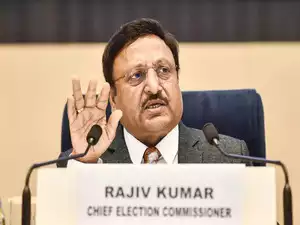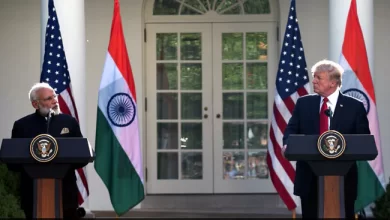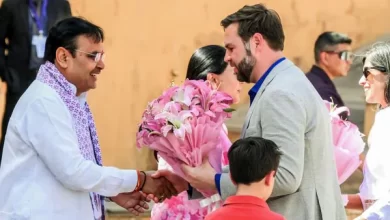
Poll management bodies adopt the Delhi Declaration as ECI meet ends
Election management bodies (EMB) from a dozen countries, including India’s Election Commission and Russia’s Central Election Commission, on Friday adopted the Delhi Declaration through which they have created a working group which will collectively negotiate with Big Tech companies — which are largely American — on issues related to online disinformation, artificial intelligence and cybersecurity. The membership of this working group is open to all EMBs and is voluntary.
“[A] working group will be constituted of all willing EMBs worldwide for dealing with issues of social media, artificial intelligence and cybersecurity, which will meet on regular basis, both virtually and for physically, to take stock of the evolving challenges and collectively take up critical issues with big tech entities and other stakeholders, as may be required,” the Declaration read.
The EMBs negotiated the terms of the Declaration at a two-day international conference called “Global Election Year 2024: Reiteration of Democratic Spaces, Key Takeaways for EMBs” convened by the ECI. In the Declaration, the signatories expressed concerns about “declining turnout, abusive campaigns, protests, violence and disputes” and took note of “the disruptive trend of fake narratives to malign the electoral process before, during and after the elections”.
During the conference, controlling disinformation campaigns and holding social media companies accountable dominated the discussions. In his closing remarks, chief election commissioner Rajiv Kumar said that disinformation and fake narratives would be amongst the top challenges for EMBs. “The unchecked use of bots, fake social media content and AI-generated content during campaign can distort public opinion and polarise societies further,” he said.
On the sidelines of the event, Kumar told that he was optimistic that such a working group could hold American Big Tech accountable and responsible even as their top honchos were backed by newly-inaugurated American president Donald Trump.
Anusuya Shanmuganathan, member of the Sri Lankan Election Commission, said that working group is like a knowledge sharing platform between different EMBs as laws governing elections and social media are unique to each country.
The signatories vowed to “vigorously resist all fake narratives that may be created to undermine the electoral process, and the conduct of elections as prescribed under our respective laws and not allow these narratives to overwhelm our duties in any manner”.
Kumar also said that indices related to democracy that are released during elections discredit the electoral process, and that indices measuring democracy and electoral integrity in the country needed to have different parameters, if not different indices altogether that could potentially be run by the EMBs. “There have been examples of ratings of democracy index being based on a few media reports and social media conversations. How is that possible? Such ratings become tools for discrediting elections. Let robustness and fairness of electoral exercise not be overshadowed or subsumed in democracy index,” he said.
“The rise of cyber attacks targetting electoral systems demands robust defences, including encryption, intrusion detection systems and advanced firewalls,” he said. He said that protection voters’ databases was necessary to both protect privacy and maintain trust in the electoral processes.
Kumar said that the future of elections would be shaped by a “blend of technological advancements, voter engagement, influx of fake narratives and the balancing of transparency with privacy”.
Kumar also said that social media companies cannot just rely on third-party fact checkers to stem the flow of disinformation. He said that this lack of accountability for social media platforms when it comes to disinformation is due to “business interests”. Platforms must to be held to a higher degree of accountability where they do not reinforce users’ existing worldviews by creating echo chambers, and use “algorithmic checks” to curb disinformation, he said. For instance, he said, platforms could use AI to detect “fake content” about EVMs where they could use AI to detect images and videos of devices that do not fit the measurements of a real EVM, and label it. He said that platforms can also label debunked and old fake narratives.
Kumar said that during the general elections, “substantial time and energy had to be diverted to arrest the menace and impact of fake content, and that too at the peak of the election cycle”.
The ECI is also figuring out how to make its recent advisories, that hold political parties responsible for abusing AI and creating deepfakes, part of the law, Kumar said. He said that after ECI’s latest advisory that required all political parties to label AI-generated content, the official handles had started tagging such content with #AIGenerated. On asking how ECI was going to crack down on abuse of AI by surrogate pages and accounts, such as meme accounts, Kumar said that memes can “never be stopped” and it is the funding of such pages by political parties that needs to be tackled, a task he said that it is not very easy.
Citing discussions in previous panels, Kumar said that biometric authentication could be used to weed out impersonators, prevent multiple votes by the same person, and tie the vote to the intended voter. He said that this needs to be balanced with voter privacy and cybersecurity. “We, in India, also started this exercise of collecting the biometrics of all the voters. The process is on. We look forward to the successes of this duly balanced with the right to privacy,” he said.
On the sidelines of the event, he told HT that in India, ECI has not taken steps to implement biometric authentication because issues related to preserving voter secrecy and privacy have not yet been resolved. He cited the 2023 writ petition challenging a 2022 amendment to the Election Laws that sought to seed Aadhaar with electoral rolls. During the case, the ECI, before the Supreme Court had submitted that Aadhaar is not mandatory to register as a voter.





